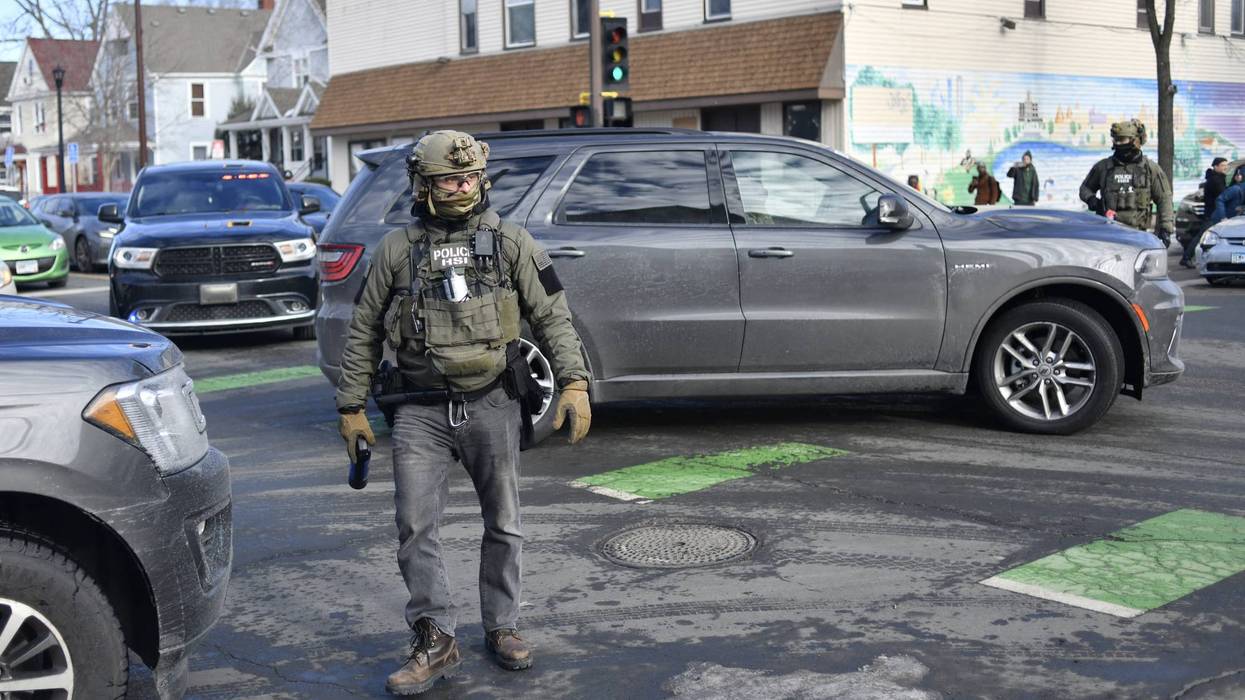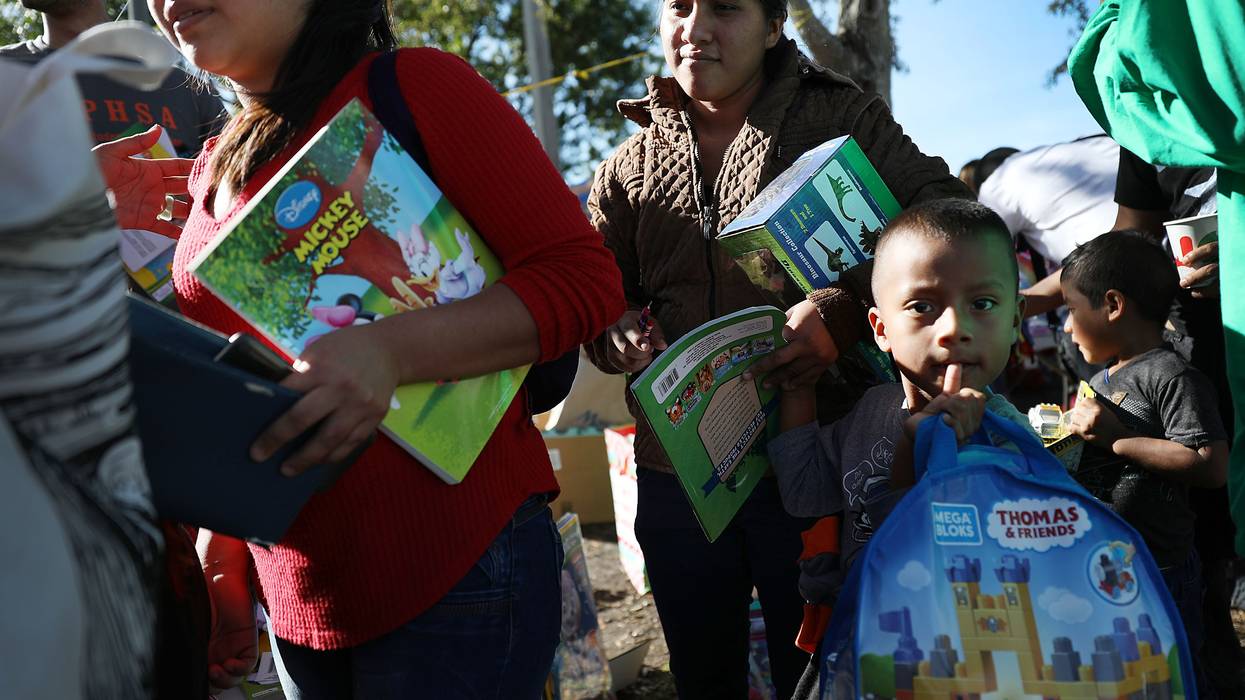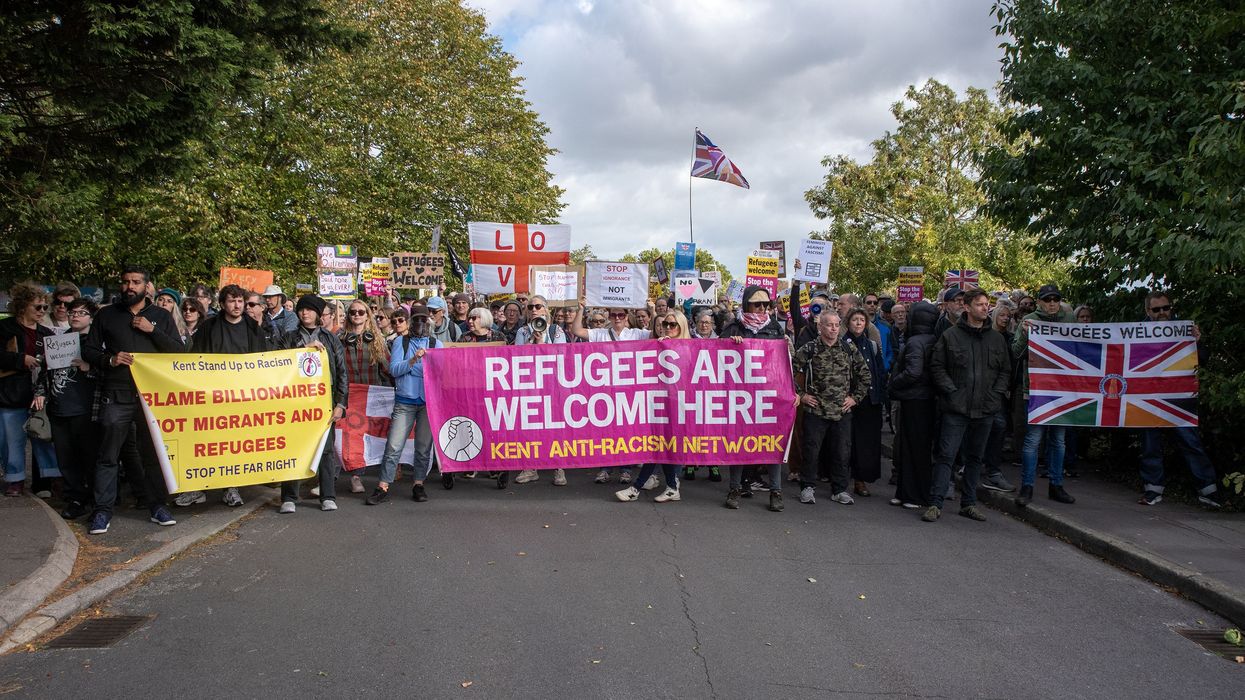Trump's Cruelty Is the Point: Making America Vicious and Unwelcoming Whether You Live Here or Not
In the first year of Trump’s second term as president, it’s become clear that, for those seeking, or even granted, asylum, the United States is no longer a safe place.
Today, during my slog through the Substack messages, newspaper headline notices, and podcast reminders that hit my inbox every morning, two stories drew my attention. Both had to do with the fact that human beings have always moved around this planet, beginning long before there were any countries or maps to display the borders where one nation ends and another begins. I was reminded of a decades-old song by the Venezuelan singer Soledad Bravo, “Punto y Raya”—“The Dot and the Dash”:
Entre tu pueblo y mi pueblo hay un punto y una raya,
la raya dice no hay paso el punto vía cerrada
“Between your people and mine,” says the song, “there’s a dot and a dash. The dash says, ‘No entrance,’ and the dot, ‘The road is closed.'” Bravo goes on to say that, with all those dots and dashes outlining the borders of nations, a map looks like a telegram. If you walk through the actual world, though, what you see are mountains and rivers, forests and deserts, but no dots or dashes at all.
Porque esas cosas no existen, sino que fueron creadas
para que mi hambre y la tuya estén siempre separadas.
And she adds, “Because those things aren’t real, they were created so your hunger and mine would remain separated.”
Two Immigration Stories
Two morning news stories brought that song back into my mind, along with the human reality it expresses. Both appeared in the New York Times (and no doubt elsewhere). The first reported that the “United States population grew last year [between July 1, 2024, and June 30, 2025] at one of the slowest rates in its history.” Such a reduction in growth was in large part due to the Trump administration’s immigration policies. In 2025, immigration rates to the United States dropped by 50% compared to the previous year. Perhaps surprisingly, Trump’s vicious and deadly deportation efforts accounted for only about 235,000 of the 1.5 million-person net decline in immigration.
Much more significant were the barriers to entry created under Trump, largely through the influence of Stephen Miller, the man Steve Bannon has labelled the president’s “prime minister.” Those include the effective closing of our southern border to undocumented arrivals. The administration has also made legal entry to the US much more difficult in a variety of ways, including:
- Instituting a $100,000 fee to be paid by employers seeking to hire professional workers under an H1-B visa;
- Erecting barriers to foreign students, leading to a 17% drop in new ones enrolling in American universities;
- Fully or partially restricting entry by the citizens (including refugees) of 19 nations: Afghanistan, Burma, Chad, Republic of the Congo, Equatorial Guinea, Eritrea, Haiti, Iran, Libya, Somalia, Sudan, and Yemen (full restrictions) and Burundi, Cuba, Laos, Sierra Leone, Togo, Turkmenistan, and Venezuela (partial restrictions);
- Pausing all asylum applications by citizens of any nation in the world, leaving a backlog of 1.4 million cases;
- Capping all refugee admissions at 7,500 per year, a reduction of 94% from previous limits (with the exception, of course, of white South African farmers).
Why does it matter that the US population is growing more slowly while also aging? As the Times points out, this country “needs a large enough population of young workers and taxpayers to finance care for the nation’s older residents, whose numbers are swelling as the Baby Boom generation retires.” As any good Marxist will tell you, labor creates all wealth. In other words, a nation’s wealth (including that of its millionaires and billionaires) represents the accumulated value of work done by actual human beings. And that means an economy lacking enough workers will not be able to satisfy the grow-or-die logic of capitalism. Nor, if a reduction of the workforce is concentrated in jobs traditionally performed by immigrants, will that economy be able to feed its people. In other words, the stubbornly high price of groceries is not unconnected to the Immigration and Customs Enforcement (ICE) terror campaign around the country.
Immigration reductions are part of the story of slowing population growth, but there’s another piece of the puzzle. During the Great Recession that began with a mortgage meltdown in 2008, Americans began having fewer children. In my world of higher education, we’ve known about this precipitous drop for a while. It’s been described as a “demographic cliff” that would become a (predictable) emergency for college enrollment 18-20 years later—that is, now. The entire higher education sector, which has grown steadily since the institution of the GI Bill at the end of World War II, now faces layoffs, retrenchment, and the closing of institutions.
What of the second story I read this morning? It concerned Spain, a country taking an entirely different approach to immigration. I’ve been lucky enough to spend time in Spain, meeting there, in addition, of course, to Spaniards, farmworkers from Mali and other parts of francophone Africa, and Central American waiters and taxi drivers, who could use their native language in a new land. (I wonder if they sound to the Spanish much the way I do—like a hick from the faraway sticks.)
Like that of the United States, Spain’s population is aging, but its response is the opposite of the Trump administration’s. Our president and his minions have made it clear in word and deed not just that they want almost no new immigrants, but also which few they would consider accepting. “Why is it we only take people from shithole countries, right?” the president asked last December. “Why can’t we have some people from Norway, Sweden, just a few? Let’s have a few from Denmark,” he added. (Of course, that was before his spat with that country over his urge to take possession of Greenland.)
Unlike Trump’s crew, the Spanish government has issued a decree permitting undocumented migrants already in the country to apply for temporary residency, with permission to work legally there. Recognizing their contributions to fueling the major engines of the Spanish economy—agriculture, tourism, and construction—Spain has bucked a European and American tide of anti-migrant sentiment, the very one Trump sought to stoke with his remarks at the recent World Economic Forum in Davos. Because of mass migration, he opined, “certain places in Europe are not even recognizable.” Critics of Spain’s new policy on the left argue that the country has been less welcoming to African migrants, but the socialist government of President Pedro Sánchez denies this (at least publicly).
Homesickness
All of this has left me thinking about the sacrifices people make when they choose, or are forced, to find a new home nation. Those of us in the US, even many who support immigrants, documented and otherwise, can fall into a trap of believing that, given the choice, everyone would rather live here. But it’s not that simple.
I spent some time in the Nicaraguan war zone in the mid-1980s. In spite of everything I loved about the early days of that country’s revolution, and how angry I became at the campaign of sabotage and torture my country unleashed to support the anti-government “contras,” there were days when I ached for the familiarity of home. The Greek roots of the word nostalgia refer to the literal pain of not being in one’s home, which describes just what I felt. I missed the everyday ease of knowing how to act without giving offense. I missed automatically understanding what was happening around me as well as, in a war zone, being able to distinguish the difference between people’s ordinary behavior and preparing for a possible attack. Most of all, I missed the feel of my native tongue in my mouth and its sound in my ears.
I knew that I would be going home in a few months, which set a limit to my homesickness. But I remember wondering then what it would be like to be a refugee, to know I’d never truly be home again. I thought about my friend Tiana, a Brazilian emigre with many years in the US, who used to talk about how she ached to hear Brazilian Portuguese. “Everything we say sounds so much more affectionate in Portuguese,” she told me. “We don’t just ask someone to pass ‘the butter’; we call it ‘the little butter,’ like a pet name.”
My grandfather must have felt that same nostalgic ache. The story my father told me was this: In 1910, after the Cossacks came to my grandfather’s village in what is now Ukraine and killed his youngest brother, the family hid him under the hay in a horse-drawn wooden wagon and had him driven out of town. He then made his way across Europe to Antwerp in Belgium, where he boarded a ship for New York City with nothing more than the name and address of a distant cousin in Norfolk, Virginia, who’d paid for his passage. He was just 18. He would then work for that cousin, almost like an indentured servant, until he eventually saved up enough money to bring the rest of his family to this country. I found evidence to support this tale when I visited the Ellis Island website and found his name and the cousin’s address in Norfolk listed in the manifest of the ship he took from Antwerp.
Cruelty Is the Point (of the Spear)
All of this is on my mind a lot these days, because most weeks I spend some time accompanying people to immigration court hearings or to their appointments with ICE. Each time I do so, I’m struck by the courage it takes to leave your familiar home, however dangerous it may have become, carrying that ache of nostalgia with you, maybe for the rest of your life. Last week, I waited outside an imposing building in downtown San Francisco, while a woman I’ll call Celia entered for an ICE check-in. The last time she’d done that, in October 2025, she hadn’t come out. Instead, she was sent to one of California’s privately-run ICE centers, the California City Detention Facility (CCDF), where she was imprisoned for the next two months.
California Sen. Alex Padilla visited that detention center recently. Having been to many jails and prisons over the years, he reported that, among other things, he expected complaints about issues like the quality of the food. “But I was shocked,” he said, “at the amount and intensity of the complaints about lack of medical care. Like, even in prisons, even under conditions of war, there [are] basic standards that we are supposed to hold and maintain. That is not happening.”
A New Yorker story by Oren Peleg about the CCDF supports Padilla’s claims. Detainees with gastric ulcers, prostate cancer, bloody urine, heart failure, and other serious medical problems told Peleg that they couldn’t get the medications or treatment they needed. It seems that CoreCivic, the company that runs CCDF, may be withholding medical treatment to encourage people to leave the country “voluntarily.” That may help explain why eight medical positions, including those of a physician and a psychiatrist, have gone unfilled for months. As Peleg writes:
But staffing issues do not fully explain the lack of basic medical care at California City. "They do it so you give up," Julio Cesar Santos Avalos, who was a detainee at California City from September to November, told me. When he arrived at CCDF, Santos Avalos recalls a consistent push by staff for detainees to sign away their rights and self-deport. Instructions for how to self-deport are displayed prominently near phones where detainees communicate with their lawyers. Santos Avalos and many of the detainees and attorneys I spoke to believe the lack of medical care is part of that push.
Peleg concludes that the “detention center is aiming to make conditions so terrible that detainees stop fighting and decide to leave.” The case of Santos Avalos is particularly searing. He lives with “chronic pain owing to a foot deformity caused by childhood cases of polio and Guillain-Barré syndrome,” but he was denied pain medication and forced to sleep in a top bunk at the detention center. He eventually chose to return to El Salvador, a country he’d left at the age of seven. As is true for many immigrants who came here as children, the home he now aches for is one in the United States.
Imagine the courage it took for Celia to smile, give herself a shake, and walk through those doors, knowing that she could very well end up back at CCDF. That day, however, we were lucky. After about 30 minutes, she emerged through the large bronze doors free—at least until her next appointment in a few months (and assuming there’s no Bay Area ICE surge in the meantime). I say “we” were lucky, because, while my fears are minor compared to hers and those of other immigrants like her, I’m always afraid that someone I’m accompanying will be taken away, leaving me angry and helpless.
Seeking Refuge
Like nostalgia, the word asylum has Greek roots. It suggests being free from someone else’s right of seizure, and so, by extension, “refuge.” When people come to this country seeking asylum, they are looking for refuge from horrors of all kinds: political oppression, familial or institutional violence, war, torture, you name it. An asylum is, by definition, a refuge, a safe place. That’s why institutions for people with mental illness used to be called “insane asylums.” (It’s been suggested that Donald Trump confuses the legal concept of seeking asylum with the term insane asylum, which is why he thinks that other countries are sending their mental patients here.)
An asylum should be a safe place, even if it may never feel like home. But in the first year of Trump’s second term as president, it’s become clear that, for those seeking, or even granted, asylum, the United States is no longer a safe place. Increasingly, as those two recent ICE murders in Minneapolis have shown, it’s not even a safe place for the rest of us.
In his poem “The Death of the Hired Man,” Robert Frost wrote:
Home is the place where, when you have to go there,
They have to take you in.
That’s what asylum is supposed to be in international law: the place where, when you have to go there, they have to take you in.
In these dark and frightening days, I often find a short sentence bubbling to the top of my mind: “I just want to go home.” I’m not quite sure what it means, but I think that, like so many people in Donald Trump’s America, I’m looking for a place that doesn’t yet exist, a refuge we will have to build with our own hands.


